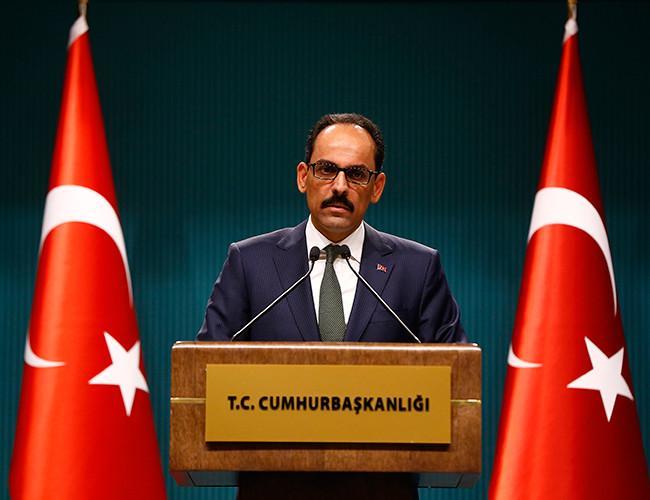
Only Turkey can decide on threats against its national security, Presidential Spokesperson İbrahim Kalın said on Dec. 1, after Pentagon said Washington would retrieve weapons that could threaten Turkey from the Syrian Kurdish People’s Protection Units (YPG).
“Not collecting arms in the region will spread instability and make it permanent. Only Turkey can decide on what a threat against its national security is,” Kalın told private broadcaster CNN Türk.
His remarks came one day after the Pentagon said the U.S. will recoup every weapon that could threaten Turkey from the YPG.
“Categorically, we will collect any arms that would threaten our ally Turkey. Turks have the inventory of those,” Pentagon spokesman Eric Pahon told Anadolu Agency on Nov. 30
Ankara considers Democratic Union Party (PYD), and its military wing YPG, as offshoots of the outlawed Kurdistan Workers’ Party (PKK), hence terrorist groups.
The PKK is listed as a terrorist organization in Turkey, the U.S. and the EU.
However, Pahon did not reveal the exact details on the inventory and number of weapons, saying he has no authority to do so.
Responding to a question on whether the U.S. would collect other equipment such as bulldozers, Humvees, IED diggers, mines and hand-made explosives, Pahon said those which do not pose a danger would not be retrieved.
“They are not combat equipment,” he added.
“We are talking about weapons.”
In addition, Pahon noted that, along with MRAP-type armored vehicles, the U.S. would also collect machine guns, rocket launchers and other weapons that have the ability to counter armored IED-borne vehicles.
According to a Pentagon budget report obtained in early June by Anadolu Agency, the U.S. military provides weapons to the YPG, which it ses as an ally in the fight against the Islamic State of Iraq and the Levant (ISIL) in Syria.
They include 12,000 Kalashnikovs, 6,000 machine guns, 3,500 heavy machine guns, 3,000 U.S. made RPG-7s and 1,000 U.S. made AT-4 or Russian made SPG-9 anti-tank munitions.
Since then, the U.S. has continuously armed the YPG, which has been heavily criticized by Turkey.